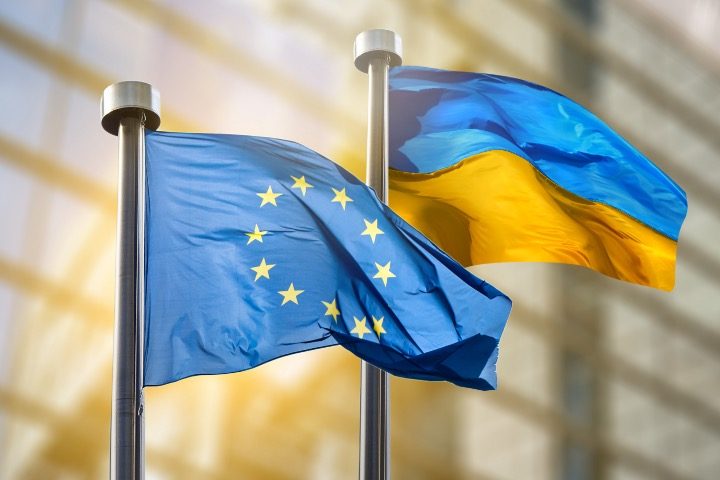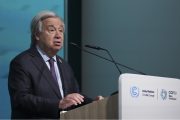
The European Commission (EC) will officially recommend starting membership negotiations with Ukraine, according to the Reuters news agency. An unidentified senior Ukrainian government official reportedly told Reuters that Kyiv anticipated the EC to deliver a “positive” evaluation of its membership bid, based on a November 6 article.
The EC’s final decision on the question of Ukraine’s membership will be made at an EU summit in December, with the bloc’s executive body slated to prepare a report on Ukraine’s progress across seven reform areas by that time. The document will also look into the progress made by Moldova and Georgia, Reuters added.
A senior French diplomat told the media outlet that the “consensus is clear” overall, and that support for Kyiv remained “very solid.”
During her visit to the Ukrainian capital on November 4, EC President Ursula von der Leyen said the country had met over 90 percent of the prerequisites to begin formal membership talks. In the meantime, von der Leyen elaborated, corruption and the rights of ethnic minorities are among the areas that have room for improvement.
Speaking last month, von der Leyen highlighted that Ukraine’s accession process was strictly “merit-based,” and that the country should not expect any alternatives to the path to full membership.
Von der Leyen’s predecessor as president of the EC, Jean-Claude Juncker, has contended that the Eastern European country is too corrupt to join the EU anytime soon.
Outgoing Dutch Prime Minister Mark Rutte noted that delineating a specific time frame for EU expansion was imprudent, after European Council President Charles Michel said he would like to see Kyiv in the EU by 2030.
The decision to start accession talks with Ukraine would necessitate the unanimous consent of all 27 member states.
Hungary has repeatedly voiced its reservations about Kyiv’s potential membership. According to the country’s foreign minister, Péter Szijjártó, Budapest will veto EU accession talks for Ukraine as long as Kyiv persists in discriminating against the Hungarian ethnic minority in the west of the country.
At the moment, the EU has two member states — Hungary and Slovakia — that object to direct military aid to Ukraine, after Robert Fico formed a government in Bratislava two weeks ago.
Recently, Italian Prime Minister Giorgia Meloni disclosed that there was “a lot of fatigue” in EU circles, and European governments were discreetly pushing for a “way out” in addressing Ukraine’s conflict with Russia.
EU aid to Kyiv is slated to run dry in December, and while the EC has pledged a package of 50 billion euros for the next four years, Hungary and Slovakia have opposed further aid. The National Bank of Ukraine estimates that international aid will drop from $45 billion this year to $38.5 billion next year, and $25 billion in 2025.
For his part, Ukrainian leader Volodymyr Zelensky has rebuffed speculations that Ukraine’s counteroffensive against Russia has stalled, and that he should start peace talks with Russia’s Vladimir Putin. “I don’t think that this is a stalemate,” Zelensky said in an interview with NBC News on November 5.
He did acknowledge that “everybody gets tired,” and “our steps forward are slow” due to “Russia’s domination in the air” and “the landmines which Russia planted.” However, “we hold the initiative in our hands … our people are mobilized, and our people have a strong desire to win,” Zelensky claimed.
The Ukrainian leader’s statements come at a time when Ukraine’s summer counteroffensive against Russian troops has failed to obtain any significant military gains, with Ukrainian troops only managing to advance by 17 kilometers.
Ukraine is grappling to recruit more soldiers, while Russia is apparently better able to deal with a drawn-out conflict. To complicate matters for Ukraine, the war between Israel and Hamas is diverting attention away from Ukraine’s call for more weapons and ammunition.
To add fuel to the fire for Zelensky, who is keen on defeating Russia and reclaiming territories seized by Russia, U.S. and European officials have begun talking to the Ukrainian government about possible peace talks with Russia, according to NBC News.
“The conversations have included very broad outlines of what Ukraine might need to give up to reach a deal,” U.S. officials admitted to the news channel. The discussions are a recognition of the military reality on the ground in Ukraine as well as political sentiments in Washington and Europe.
Back in the United States, there has been decreasing eagerness to back Ukraine, particularly among Republicans and their voters, as the campaign for next year’s presidential election is underway.
U.S. President Joe Biden wants Congress to approve a $106 billion supplemental spending bill, with most of the money to boost Ukraine’s defenses and the remainder divided among Israel, the Indo-Pacific, and border enforcement.
The Republican-led U.S. House of Representatives has proposed its own funding plan, which does not encapsulate any increase in aid for Ukraine.
Furthermore, a Gallup poll released a few days ago revealed dropping support for sending additional aid to Ukraine. The poll results showed that 41 percent of Americans think the U.S. is doing too much to help Kyiv, a 17-percent point rise compared to three months ago.
Reacting to news of Western governments pushing for peace talks, Zelensky told NBC News:
They know my position. That is the position of my country. That is the position of our people. We don’t want to make any dialogue with terrorists.… I am not ready to speak with the terrorists because their word is nothing. Nothing.
At a news conference in Kyiv on November 4, Zelensky disavowed claims that Western leaders were pressuring him to start the talks with Russia. “For us now to sit down with Russia and talk and give it something — this will not happen,” he said.
Ukraine has maintained that it aims to recapture all the territory taken by Russia, including Crimea, which joined Russia in 2014. Russia presently dominates about one-fifth of Ukraine’s internationally recognized territory.



